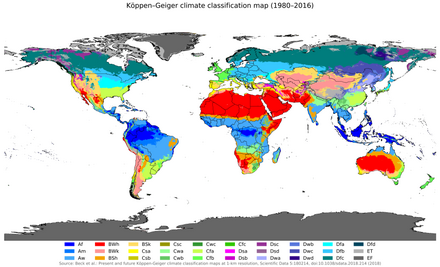
Back Klimatologie ALS علم المناخ Arabic Climatoloxía AST जलवायु बिज्ञान AWA Klimatologiya Azerbaijani Klimatuoluogėjė BAT-SMG Кліматалогія Byelorussian Кліматалёгія BE-X-OLD Климатология Bulgarian जलवायु बिज्ञान Bihari

 |
| Meteorology |
|---|
| Climatology |
| Aeronomy |
| Glossaries |
Climatology (from Greek κλίμα, klima, "slope"; and -λογία, -logia) or climate science is the scientific study of Earth's climate, typically defined as weather conditions averaged over a period of at least 30 years.[1] Climate concerns the atmospheric condition during an extended to indefinite period of time; weather is the condition of the atmosphere during a relative brief period of time. The main topics of research are the study of climate variability, mechanisms of climate changes and modern climate change.[2][3] This topic of study is regarded as part of the atmospheric sciences and a subdivision of physical geography, which is one of the Earth sciences. Climatology includes some aspects of oceanography and biogeochemistry.
The main methods employed by climatologists are the analysis of observations and modelling of the physical processes that determine climate. Short term weather forecasting can be interpreted in terms of knowledge of longer-term phenomena of climate, for instance climatic cycles such as the El Niño–Southern Oscillation (ENSO), the Madden–Julian oscillation (MJO), the North Atlantic oscillation (NAO), the Arctic oscillation (AO), the Pacific decadal oscillation (PDO), and the Interdecadal Pacific Oscillation (IPO). Climate models are used for a variety of purposes from studying the dynamics of the weather and climate system to predictions of future climate.[2]
- ^ Climate Prediction Center. Climate Glossary. Archived 2006-10-06 at the Wayback Machine
- ^ a b "What is Climatology?". drought.unl.edu. Archived from the original on 2 August 2019. Retrieved 27 February 2017.
- ^ "Glossary". Archived from the original on 6 October 2006. Retrieved 23 November 2006.
{{cite web}}: CS1 maint: bot: original URL status unknown (link)